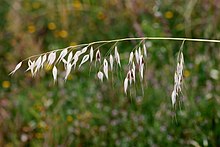| Common wild oat | |
|---|---|

| |
| Scientific classification | |
| Kingdom: | Plantae |
| Clade: | Tracheophytes |
| Clade: | Angiosperms |
| Clade: | Monocots |
| Clade: | Commelinids |
| Order: | Poales |
| Family: | Poaceae |
| Subfamily: | Pooideae |
| Genus: | Avena |
| Species: | A. fatua
|
| Binomial name | |
| Avena fatua | |
| Synonyms[1] | |
|
Synonymy
| |
Avena fatua is a species of grass in the oat genus. It is known as the common wild oat. This oat is native to Eurasia but it has been introduced to most of the other temperate regions of the world. It is naturalized in some areas and considered a noxious weed in others.[2][3][4]
A. fatua is a typical oat in appearance, a green grass with hollow, erect stems 1 to 4 feet (0.30 to 1.22 m) tall bearing nodding structures – panicles – of spikelets. The long dark green leaves are up to 1 centimetre (0.39 in) wide and rough due to small hairs. The seedlings are also hairy. The seed kernel is thinner, longer, darker and hairy when compared with the seed of the common cultivated oat (A. sativa). This species and other wild oats can become troublesome in prairie agriculture when it invades and lowers the quality of a field crop, or competes for resources with the crop plants. It takes very few wild oat plants to cause a significant reduction in the yield of a wheat or cultivated oat field.[5][6]
- ^ The Plant List, Avena fatua L.
- ^ Adolfo María, H. 1966. Nómina de las plantas recolectadas en el valle de Cochabamba 2: 1–86. Colegio La Salle, Cochabamba
- ^ Burkart, A. E. 1969. Gramíneas. 2: 1–551. In A. E. Burkart (ed.) Flora Ilustrada de Entre Ríos. Instituto Nacional de Tecnología Agropecuaria, Buenos Aires
- ^ Cabi, E. & M. Doğan. 2012. Poaceae. 690–756. In A. Güner, S. Aslan, T. Ekim, M. Vural & M. T. Babaç (eds.) Türkiye Bitkileri Listesi. Nezahat Gökyiğit Botanik Bahçesi ve Flora Araştırmaları Derneği Yayını
- ^ Moore, D. M. 1968. The vascular flora of the Falkland Islands. British Antarctic Survey Scientific Reports 60: 1–202, 1–6 pls
- ^ Welsh, S. L. 1974. Anderson's Flora of Alaska and Adjacent Parts of Canada i–xvi, 1–724. Brigham Young University Press, Provo